Characters:
Mary and Martha
Jesus
Judah Ben-Hur
The scene is the Mount of Olives; Jesus sits on a stone bench staring forward; Mary enters, followed by Martha.
MARY (to MARTHA).
I’ve found him.
MARTHA.
Where?
MARY.
Sitting right here like nothing happened.
MARTHA (to JESUS).
What do you think you’re doing?
JESUS.
Watching.
MARY.
For what?

Temple of Herod, Holyland Model of Jerusalem.
JESUS (pointing).
The Temple is about to fall; soon
not one stone will be left upon another.
Watch here and see for yourself.
MARTHA.
Nonsense.
MARY.
Let’s run.
Your disciples have fled already.
JESUS.
Why run? What’s the danger?
MARY.
After what you did just now?
MARTHA.
You’re joking!
MARY.
The Temple guards—
they’ll find you here and take you!
JESUS.
No. Not today. My betrayal is still
four days away—I’m safe till then.
Do you know how my Father makes figs?
MARY.
No parables, please!
MARTHA.
Not right now!
Let’s hurry home to Bethany
where we will all be safe
and you can tell your stories
and I can make you dinner
while she sits at your feet
doing nothing as usual.
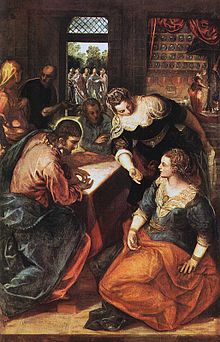
Tintoretto: Jesus at the Home of Martha and Mary.
JESUS.
Since you’re curious, I’ll tell you.
My Father sinks his mighty hand
into a soft shaft of sunlight
as if it were riverbank clay—
like this, you see? And he seizes
a warm, pliant fistful of it
and squeezes it tight—like this.
See how the yellow light
oozes out between my fingers?
He holds the sunlight fast
a little while—just like this—
then slowly loosens his grip
to reveal a ripe and luscious fig
that tastes just like the sun.
(JESUS opens his hand to reveal a coin)
MARTHA.
But I don’t see a fig.
MARY.
I see a coin with Caesar’s face on it.
(JUDAH BEN-HUR enters.)
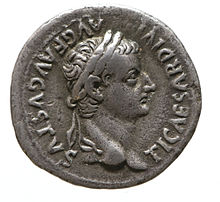
Denarius of Tiberius, known as the tribute penny.
MARY (to JUDAH).
Go away!
MARTHA.
He’s innocent!
MARY (to JUDAH).
You’ve got the wrong man!
JUDAH.
Foolish women—what do I look like?
A priest, a Temple guard, a stooge
of Herod or Pilate, either one?
MARTHA.
Who are you, then?
JESUS.
I’ll tell you.
His name is Judah, a son of Hur—
an angry soul, filled with hate.
The friend he most loved in his youth
betrayed him into Roman slavery;
he was chained for three years
to a galley’s oar; but he won freedom
and became a Roman citizen;
yet still he remains a Jew—
the most bitter Jew in Israel.
MARY.
You’re bitter yourself today.
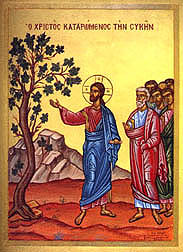
Byzantine icon of Jesus cursing the fig tree.
JESUS.
So I am. I wish I knew why.
(to JUDAH)
I killed a tree this morning—
an innocent fig tree just outside
the city gates. A strange thing to do.
MARY.
It bore no figs.
MARTHA.
It’s not the season.
JUDAH.
You’re a carpenter, and a carpenter’s son;
that wasn’t the first tree you’ve killed.
Learn to kill men, my Lord.
It’s the one thing I have to teach you.
JESUS.
Can you teach me to kill men without rage,
the way a carpenter kills a tree?
JUDAH.
What you did just now at the Temple—
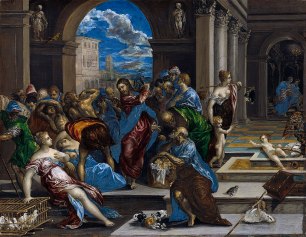
El Greco: Christ Driving the Money-Changers from the Temple.
JESUS (interrupting).
A mistake. The Temple now
belongs to Caesar, not my Father.
I had no business there at all.
Its time is over—in moments now
a breath of icy love will send it
crashing under its own weight,
the weight of this world’s greed.
JUDAH.
The Temple won’t fall—not till
you bring it down yourself.
The moment is now—you mustn’t wait!
The money changers’ backs are stinging
from the whippings you gave them,
and they scuttle about like scorpions,
grubbing up the coins you spilt
when you overturned their tables—
denarii, drachmas, darics, shekels,
the currencies of all the world
jumbled in gibbering heaps,
worth nothing until they’re sorted
and weighed anew. All commerce
is suspended—and all authority,
the power of priests and Rome alike.
The time is here—this very moment—
to cast off the yoke of Rome,
to lift up the poor and crush the rich,
and make of Israel the Kingdom
that you yourself have promised.
JESUS.
And you’ve raised three legions
to bring me victory. Right now
they mingle like cutpurses among
these millions who have come
to Jerusalem to celebrate
the Passover.
JUDAH.
How did you know?

Ramon Novarro as Ben-Hur, 1925.
JESUS.
Three years you followed me
with thousands of men with knives
in their belts. I wasn’t supposed
to notice? While I sought farmers
and fishermen and tax collectors
and mothers, wives, and harlots,
you gathered soldiers. You trained them
in the lava beds—to guard and strike
with their fists, to cut and thrust
with javelins and swords,
an army of Galileans styled
like Romans to destroy the Romans.
JUDAH.
Your army—the Kingdom’s army.
JESUS.
Are you sure they are enough?
Do they have spears that hurl themselves
from tunnels forged from iron
and tear men’s bodies to pieces?
Do they ride winged chariots
that drop fire from the sky,
consuming cities faster than thought?
Can you make the winds themselves
breathe writhing and devouring death
into your enemies’ bones?
Can you unleash the power of the sun?
Do you have an arm like God?
JUDAH.
Rabbi, why all these riddles?
Why do you brood and wait?
Rome’s power is puny beside yours.
Rise up now, work miracles
to liberate Israel—the kind
I’ve seen you work a hundred times.
JESUS.
Miracles? What miracles? Tell me.
JUDAH.
You’ve healed the sick and lame,
the palsied and the paralyzed,
cast out devils, made blind men see;
you cured and cleansed my own
dear mother and sister of leprosy;
and Lazarus, these women’s brother—
he died, you gave him life again;
and when a multitude was hungry
you fed them, all of them.
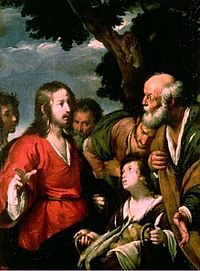
Bernardo Strozzi: Feeding the Multitudes.
JESUS.
Wait—I fed a multitude, you say?
MARY.
Of course you did.
MARTHA.
You know you did.
JESUS (to JUDAH).
Were you there?
JUDAH.
Right near you, yes.
JESUS.
So tell me—how did I do it?
JUDAH.
My Lord, everyone knows—
JESUS.
No—not what you’ve heard,
but what you saw and felt and did.
I want to hear it.
JUDAH.
Five thousand gathered by the sea
to hear you speak—but where
was food enough for them to eat?
Two hundred denarii would not buy
enough bread for that multitude.
JESUS.
And you—did you lack food as well?
JUDAH.
No. I’d brought bread of my own,
and so had others, but not most;
thousands more were waiting, hungry.
Then Andrew found a boy who’d brought
five loaves of barley and two fishes.
You told the multitude to sit
and gave thanks to your Father;
you broke the bread and gave it to some,
and you gave away the fishes,
and then … Oh, Lord, I am ashamed.
JESUS.
Tell me.
JUDAH.
I’d had no wine, and yet
I became drunk—drunk and hungry.
I tore my own bread, stuffed my mouth,
and then …
JESUS.
Tell me.
JUDAH.
The old man next to me—
his hunger became mine,
his wrinkled lips, his aching belly,
I felt his craving as my own.
And on my other side, a mother
unfed, her baby at her breast—
I became her too, I felt the grip
of her baby’s gums pulling her dug,
felt the dryness inside her.
And then … Oh, Lord …
JESUS.
Tell me.
JUDAH.
I rose stark mad to my feet, reeling
with bounty and munificence,
and tore my bread and crammed
some in the old man’s hand, then
in the mother’s too, and staggered
giving amid the multitude
while others, as drunk with love as I,
reeled all around me, giving
and receiving much, much more
than all their fill. And then—
and then when it was all done …
MARY.
Twelve baskets were left brimming
with bread and fishes …
MARTHA.
… the leavings after
the five thousand were sated.
JUDAH.
But I … Oh, Lord …
JESUS.
Tell me.
JUDAH.
Such horror of great brightness!
I was sick to my soul, lost to myself—
lost, all lost, the son of Hur,
his lonely desire, the solitary
warrior thirsty for vengeance,
all gone, my precious life was gone.
I ran down to the Galilean shore
and retched up all I’d eaten until
I was alone in my own skin
and not filled with a multitude
made drunk with lovingkindness.
(JUDAH is weeping.)
JESUS.
Leave me now, Judah—go.
You have chosen another way.
JUDAH.
How can you be so indifferent?
JESUS.
What do you think I am?
JUDAH.
You are my King, Israel’s King,
much mightier than Caesar,
more splendid even than Solomon—
a king to rule the world forever.
JESUS.
I am a door. A door is indifferent;
it makes way to everyone.
(MARY and MARTHA begin to reel about, as if drunken.)
MARY.
What’s this?
MARTHA.
What’s happening?
MARY.
The ground—it rolls and shakes.
MARTHA.
I can’t stay on my feet.
MARY.
I can’t either.
(JESUS and JUDAH seem undisturbed by the forces felt by MARY and MARTHA.)
JESUS.
Dance, then.
MARTHA.
Yes!
MARY.
If we can’t stand, we’ll dance!
(MARTHA and MARY dance wildly to silent music.)
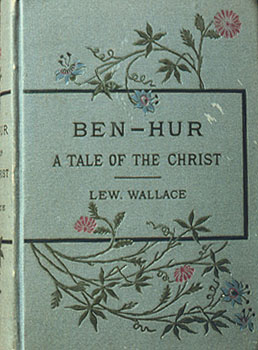
Original edition of Ben-Hur by Lew Wallace
JESUS (to JUDAH).
All love is cold and open.
I am the open door of love;
to pass through, open yourself,
go naked through the cold,
or else consign yourself forever
to the Kingdom of Caesar.
JUDAH.
Forever?
JESUS.
Each moment is forever;
the Temple is always standing;
the Temple is always falling.
MARY (pointing).
Look!
MARTHA (pointing).
Look there!
MARY.
The Temple!
MARTHA.
It’s dancing too!
MARY.
No, it’s falling!
MARTHA.
Its white stone frowning faces,
its porticoes, pinnacles, ramparts …
MARY.
… all breaking, breaking
like twigs in children’s hands!
MARTHA.
The sacred veil tears clean in two …
MARY.
… the Holy of Holies now
stands revealed …
MARTHA.
… now disappears
into the vaults below …
MARY.
… and dust clouds billow skyward!
MARTHA.
The air rings with falling stone …
MARY.
… the thunder and music of love!
MARY.
Let’s go there—before the dust settles!
MARTHA.
Yes, we’ll dance among the clouds!
(MARY and MARTHA hurry away.)
JESUS (to JUDAH).
Hatred is soft and sweet;
love is hard and bitter.
My time in this place is done.
The friend I love most of all
will soon betray me out of love—
cold and indifferent love,
strong and unyielding love,
the biting kiss of love.
(JESUS leaves; JUDAH stands alone, facing forward.)
JUDAH.
But the Temple—it still stands!
END OF PLAY.
—Wim